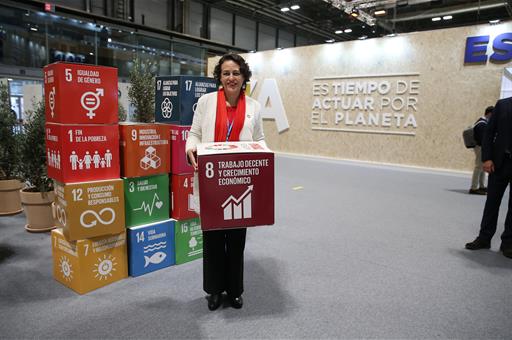Magdalena Valerio announces that the fair transition must be tackled comprehensively to avoid leaving those most vulnerable behind
News - 2019.12.12
Magdalena Valerio was taking part in the discussion on the trade union day entitled "A Just Transition and the Future for Work", which formed part of the activities of the Ministry of Work, Migration and Social Security at the United Nations Conference on Climate Change being held in Madrid (COP25 Chile-Madrid).
In the debate the minister said that there can only be a just transition if there is inclusive and sustainable growth focused on human beings, so that working people do not become the adjustable variable of the changes taking place. Moreover, this transition must involve a commitment to quality jobs and active policies that make it easier to find jobs through the design of inclusive policies and reforms, "committed to a labour market that is focused on training and the mobility of people".
"In this transition period we cannot leave people by the wayside. We have to accompany them; we have to set up a global umbrella protection focused on job finding and customised training", explained the acting minister, who added that to do so there has to be good coordination between all the public authorities in the country.
In her opinion, social policies have to be applied carefully in order not to endanger "our efforts in the fight against climate change, and for this to be possible in the long term, they must be implemented through committees of social dialogue", with the close collaboration with the Ministry for the Ecological Transition.
Business commitment, just transition and decent green jobs
Magdalena Valerio has also taken part in the panel discussion "Business Commitment to a just transition and decent green jobs". Her speech positively valued the results obtained by coordinated action by the business sector and governments for the work agenda and a just transition in line with the guidelines of the International Labour Organisation (ILO).
Among the business initiatives for sustainable development, the minister highlighted the environmental, social and good governance criteria; promotion of sustainable investment to carry out the Sustainable Development Goals, with the aim of generating decent work, productive jobs and more sustainable societies; and the principles for responsible investment.
After putting on the table the commitment of the public authorities to develop a framework for public procurement that will be an engine for driving corporate sustainability, Magdalena Valerio recalled that the transitions of the future in the labour market "must be related to a shift in the system of production towards a low-carbon economy marked by economic digitalisation, robotisation, artificial intelligence, ageing and the demographic challenge".
The minister announced her commitment to the launch of a Global Green Pact including the business sector and trade unions, to develop active policies of reclassifying and promoting workers' mobility. "Green job promotion policies must also guarantee that women take advantage of the opportunities provided by transformation", added Valerio, who also stressed the need for policies with a profound impact on equality of treatment and opportunities in employment and activity.
The green economy
In the afternoon there was also a panel discussion on "Skills for Green Jobs" which presented the report bearing this name prepared by the ILO. The green economy involves the process in an economic system that reduces its environmental impact and pollutant emissions, while making gains in efficiencies not only in ecological terms but also in terms of improving human and social welfare and the transition to a green economy, requiring the acquisition of new and greater professional skills.
Also taking part in the event were the State Secretary for Work, Yolanda Valdeolivas, who said "we are moving towards an economy that will require constant retraining, given that the challenges of our time are complex; so the public authorities must increase the capacity of working people to adapt and reduce the impact of the most vulnerable sectors". To this end, explained Valdeolivas, "it is essential we have an inclusive growth strategy that includes the design of active policies that cover identifying the training needs of the labour market, promoting specifically tailored support for working people through mentors and protection for people in the periods between jobs".
Non official translation





